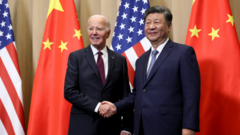Xi underscored his commitment to maintaining a stable relationship with the United States, despite the turbulence that marked Biden's administration. He articulated a willingness to communicate and cooperate while managing the inherent differences between the two major powers. In contrast, Biden cautioned against allowing strategic competition to escalate into conflict, promoting the idea that coexistence is feasible even amidst competition.
As Trump prepares to take office again, analysts voice concerns about the potential for an uptick in tensions due to Trump's historical stance toward China. His administration's promise of substantial tariffs—up to 60% on Chinese imports—could signal a return to aggressive economic tactics that characterized his first term. Additionally, Trump's inclination to appoint high-profile critics of China to crucial roles raises further apprehensions in Beijing.
Biden's tenure was not devoid of friction with China, featuring incidents like the spy balloon saga and heightened military maneuvers around Taiwan. The Biden administration, while continuing some of Trump's tariffs, aimed to responsibly navigate the rivalry with a focus on stability and productive communication, building on the groundwork established over three in-person discussions with Xi.
Xi and Biden's acknowledgments of their bipartisan challenges echoed a mutual understanding of the need for dialogue. Both leaders aim to avert a conflict-driven relationship, though the unpredictability of the incoming Trump administration remains a central concern for Beijing. The interplay of competition, cooperation, and concern for escalation will shape the future dynamics of US-China relations as the incoming administration transitions into office.
As Trump prepares to take office again, analysts voice concerns about the potential for an uptick in tensions due to Trump's historical stance toward China. His administration's promise of substantial tariffs—up to 60% on Chinese imports—could signal a return to aggressive economic tactics that characterized his first term. Additionally, Trump's inclination to appoint high-profile critics of China to crucial roles raises further apprehensions in Beijing.
Biden's tenure was not devoid of friction with China, featuring incidents like the spy balloon saga and heightened military maneuvers around Taiwan. The Biden administration, while continuing some of Trump's tariffs, aimed to responsibly navigate the rivalry with a focus on stability and productive communication, building on the groundwork established over three in-person discussions with Xi.
Xi and Biden's acknowledgments of their bipartisan challenges echoed a mutual understanding of the need for dialogue. Both leaders aim to avert a conflict-driven relationship, though the unpredictability of the incoming Trump administration remains a central concern for Beijing. The interplay of competition, cooperation, and concern for escalation will shape the future dynamics of US-China relations as the incoming administration transitions into office.




















